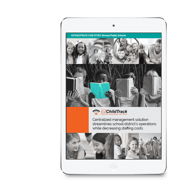
Even though Tax Day comes three days later than usual, it still strikes tension, if not fear, into the heart of every self-employed person in the United States, including those who operate a daycare business.
Typically the most problematic part of doing your taxes involved determining whether or not a particular item or service can be used as a deduction to lower your tax bill. You may be surprised at what the IRS allows as long as you follow the rules.
One caveat: this post is for informational purposes only. For accurate guidance on your specific situation, see a professional tax preparer or attorney.
Your Home
Deducting your home for business use requires determining the percentage of your home that is used strictly for business purposes. With a daycare business, you can deduct portions of your home for both daycare and personal use, but there are several stipulations.
- You must be in business as a childcare provider.
- You must have a license, registration or other designation from your state as a daycare provider home.
- You must calculate the area used for daycare.
- If the home is also for personal use, you can only deduct a portion of the amount based on how much you use it for your business.
When you measure the area of your home for these calculations, you should include the basement and garage if you have them. As always, tax laws change, and new clarifications about deductions are often issued annually.
In the case of business-use-of-home calculations, your tax professional should pay particular attention to any changes because it represents such a significant portion of your tax situation.
The Child Care Provider Audit Technique Guide has an expanded section of how to calculate this deduction, including the requirement that daycare providers must use a regular-use standard instead of the exclusive-use standard that other types of home-based businesses use.
Child-Related Supplies
Anything and everything strictly used for and by the children in your care can be deductible.
Arts and crafts supplies, games and toys, and books as well as diapers, wipes, and baby gear can be written off. But did you know you can count other items as child-related supplies?
- Trays, baskets, and other containers for toys, items of decor, music, playground equipment, and curriculum expenses
- Cups, plates, and silver or plastic ware
- Sheets and blankets, and cots or nap mats are also deductible, as long as they are only used in your childcare business.
Furniture and Appliances
Again, record whether these items are used for both daycare and personal use. In most cases, you will only deduct the time and space percentage. However, if you purchase and maintain equipment for special needs that you only use for your business, you can use it as a typical deduction.
Furniture you can write off includes tables, shelving, desks, chairs, and couches. Appliances include the microwave, washer and dryer, stove, and dishwasher. Certain electronics may also be deductible including the TV, DVD player, and other items.
Appliances, furniture, and electronics are commonly purchased and used before you started your daycare business. The tax guide is clear about depreciation after the item starts being used for the business. The guide states, “The fact that the asset was only used for personal purposes prior to being placed in service does not disqualify it from being converted to use in the business.”
Be aware that you will be held to a higher standard of record-keeping than other small business owners due to the unique nature of your business. You must be prepared to demonstrate the percentage of time these items were used for business as opposed to personal.
Business and Office Supplies
Besides the supplies used strictly for childcare, you can claim business and office expenses for office and business supplies, including printers, paper, envelopes, file folders, receipt books, and writing instruments.
Keep all receipts for these items if you plan to deduct them.
- The IRS requires proof that you purchased the supplies and verification of how much you spent.
- When you make purchases for your daycare, buy them separately from your personal purchases.
- Mixing business and personal financial information of any sort is a bad idea, even though it may seem convenient at the time.
Without the proper records and receipts and proof of how the items were used, your deduction may be denied, and you will end up owing the IRS the underpaid taxes as well as interest and penalties.
Tracking Time with Daycare Software
While not a deduction, the hours you spend working on your business when the children aren’t there also reduces your tax liability. You can add a significant number of hours to your annual working hours, which substantially decreases your time/space percentage.
- Before you count the hours, make certain they only count towards your business.
- You can track the hours you spend on business tasks like planning and preparing for activities, planning and preparing meals, loading and unloading the dishwasher, cleaning the toys, shelves, and furniture, and doing laundry.
- You can also keep track of the time you spend on marketing, interviews, and tours, reading and taking continuing education classes about childcare, and a wealth of other hours spent for your business.
Any time you spend doing something that only relates to daycare from remodeling your home and creating contracts and forms to the actual service can be used to reduce your taxes.
Anything related to taxes, always maintain accurate records for all deductions and time spent on the business. In the event of an audit, you need documentation of some sort showing that you purchased an item or performed work for the IRS to accept it. Having strong childcare software can help this process, by tracking everything in one cloud-based environment.
Knowing about all these deductions and methods of reducing your tax liability should take away some of the sting of filing and paying taxes. Consult a tax professional to learn about all the deductions and other ways you can shrink your tax bill.




